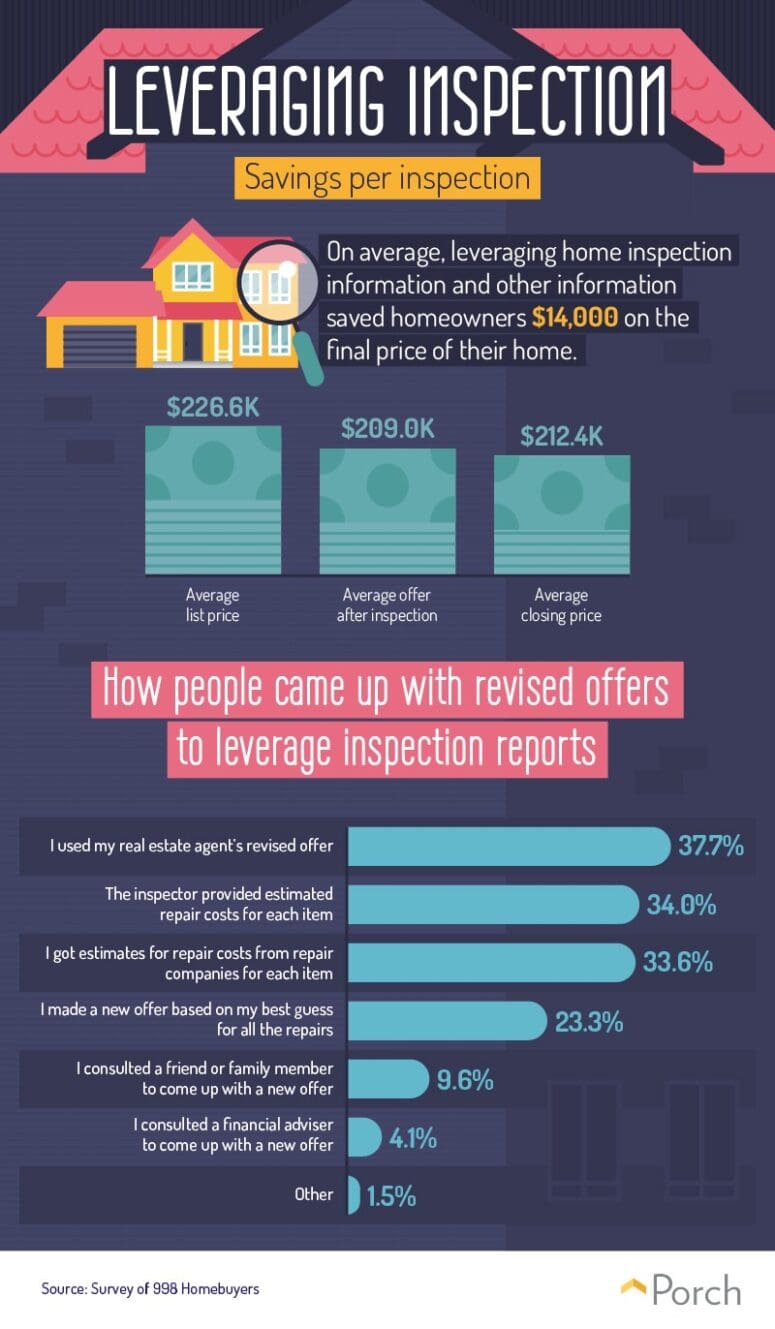

Emma's work has been featured in Huffington Post, NPR and XOJane. When she's not combing her neighborhood for open houses, she's writing about technology, real estate or data.
You’ve paid for a professional home inspection on the home you hope to buy, reviewed the results, and made what you believe to be some fair requests based on the inspector’s findings.
At this point you planned to shake out a better deal using information you simply didn’t have when you made the offer. But the sellers deliver an unexpected blow: they aren’t willing to negotiate at all on repairs, credits, or price. Period.

When a seller isn’t willing to negotiate after the inspection, you face a dilemma. The home inspection traditionally reopens the door for some back and forth, saving buyers on average $14,000 on their home purchase, according to a study from Porch.com of nearly 1,000 homeowners. That’s a lot of money to leave on the table as a buyer.
But at this point you’re already in deep with this house. You’ve pictured living there. You imagined how you’d make it yours. It’s not just about money. Your heart is also on the line.
Although it feels like there are many factors at play, you’re basically left with three choices:
To help you pick a path, let’s review the considerations that could sway your decision toward the right option so you don’t end up with regrets no matter the outcome, i.e., buying a house you can’t afford to make livable, or throwing away your dream home over a measly couple hundred bucks.
A home may well be the most expensive purchase you make in a lifetime. It’s only natural to look over this investment with a critical eye. But there is such a thing as taking the findings of an inspection too far or offending the seller with unreasonable requests.
Put simply, reasonable requests include “things that are unsafe, that are broken, and that would hurt the property value if they stayed that way,” says top performing Kansas City area agent Edie Waters. That will typically include items such as:
These problems pose not only a risk to the value of the home but a risk to the safety of your family. Certain issues could also make it harder to secure a mortgage.
On the other hand, nit-picky requests can be categorized as “nice to have” changes to the home. Some repairs fall in a gray area (such as a roof that doesn’t show signs of damage but due to its age, would be hard to insure). When in doubt, check with your agent — they’ll know what’s considered up for negotiation and what’s really too small potatoes to bring up.
If the repairs you asked for weren’t necessary in the first place, then you should feel comfortable moving onto closing without negotiating further. These repairs don’t jeopardize your safety in the home, and you can take care of them yourself or hire a handyman to complete the project after closing.
If you’re worried about a major request that would impact your ability to live in the home or its value down the line, then keep reading.

Some forms of negotiation are more effective than others. If the sellers froze you out after your inspection requests, take a minute to revisit how you went about making your case. Were your demands backed by the facts? Were you using cost estimations or exact numbers?
A certain amount of tact, reason, persuasion, precision, and expertise can go a long way. According to the same Porch.com study which surveyed homeowners on their home inspection experiences, the most common ways people came up with revised offers were:
These methods outranked strategies like making a “best guess” for repairs or consulting family and friends on the new offer.

The state of the market could be a deciding factor on whether you move on to the closing table or walk away from the house.
In a seller’s market, where buyer demand is high, but there aren’t many homes for sale, sellers hold all the cards. It could be that the sellers of a home know that they could line up another buyer easily (maybe your offer was one of many in a bidding war) and you’ll have to accept that you don’t have any leverage.
That doesn’t mean you shouldn’t weigh the decision carefully. Water encourages buyers to get an estimate for the work the property requires, regardless of whether the sellers agreed to negotiate:
“Let’s say the total for repairs comes to $500,” Waters explains. “Before you walk away, ask yourself ‘Is it worth it to walk away from something you love for $500?’” On the flip side, an estimate for tens of thousands of dollars in repairs may be the reality check you need to move on.
Now, if you’re negotiating in a buyer’s market, the tables are turned. If you threaten to walk away, the seller might recognize that they’d rather work with you than start from square one to attract another buyer when the market is slow.
But such a “call your bluff” move could always backfire: the seller may choose to let you walk away. Work with your agent to understand your options, and decide on a strategy that’ll give you the best outcome.

With an understanding of the market, you’ve got an idea of how much leverage you have based on market conditions. But you also need to think about how motivated you are as a buyer to find a house, as well as how much time, money, and know-how you have to make repairs:
What’s your level of urgency?
Have you already sold your current home, or is your lease set to expire in a matter of days? Are you relocating for a job under a tight timeline? If this deal falling through will leave you without a place to live, then you need to factor that into your decision (or start calling up friends who’ll let you couch surf).
When you’re in no rush, you’ve got more wiggle room to go out and find a better deal if necessary. Just know, it could be several months before you pick another place — the average buyer spends 10 weeks and looks at a median of 10 homes before making an offer.
How ‘handy’ are you?
If you’ve tightened a few leaky faucets in your day and know how to patch up drywall, then taking on a few DIY projects after closing will be no big deal.
Make a list of what you’d need to fix, and determine what you could achieve on your own. DIY projects typically cost less than enlisting a professional but make sure you know what you’re doing — 43% of homeowners confess they’ve screwed up an at-home repair at least once.
What’s your budget for making repairs?
Buyers will often inflate their budgets for a home they love. One study found that buyers spent over $16,000 more than they planned to snag their dream home. If the offer you made on a house was already a stretch, and you wouldn’t have enough money in reserve to make necessary repairs, that’s a tough position to be in financially.
When a seller won’t budge, the crux of the decision is between taking on the cost and work of the repairs yourself or walking away with earnest money in your pocket. So many factors are involved in the decision, but here are the main points you should focus on.
Go forward with the deal if:
1. The repairs don’t impact the safety or livability of the home.
2. The repairs are significant, but you’re able and willing to make them yourself and your budget allows for it.
3. You still love the house and think it’d be hard to find another one like it.
Walk away if:
1. The required repairs push the home out of your price range and should you leave them, would make the house impossible or difficult to live in comfortably.
2. The things you love about the house fail to outweigh what’s wrong with it.
3. You hate to start your home search over, but you’ve got the time and flexibility to find a better deal.
There’s no one right answer, but these guiding principles might nudge you in one direction or the other. From there, go with your gut, and the advice of your trusted real estate agent.
Header Image Source: (Domenico Loia/ Unsplash)
At HomeLight, our vision is a world where every real estate transaction is simple, certain, and satisfying. Therefore, we promote strict editorial integrity in each of our posts.
Emma's work has been featured in Huffington Post, NPR and XOJane. When she's not combing her neighborhood for open houses, she's writing about technology, real estate or data.
Share this post